#Fiction podcasts
Text
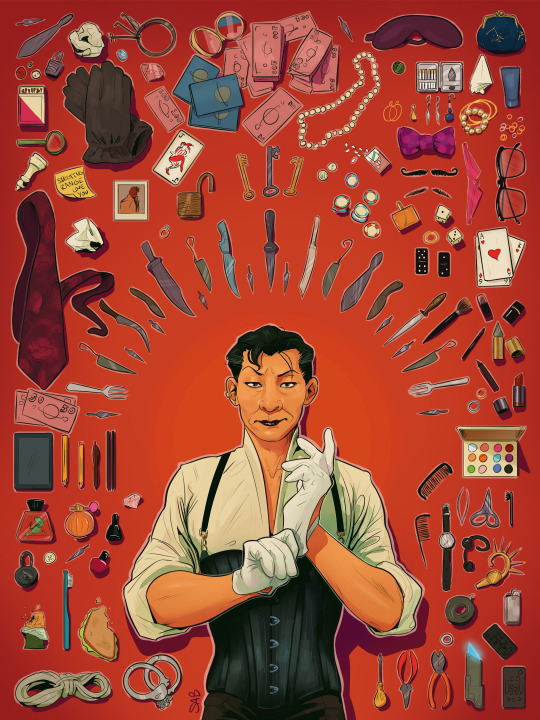
Inside a thief's pockets | Prints
#realized I’d never made an official post for this one#the penumbra podcast#tpp#digital art#tpp fanart#peter nureyev#juno steel#fanart#juno steel tpp#sabtpp#sabworks#tpp peter#character illustration#character design#flat lay#illustration#digital drawing#fiction podcast#podcast#audio drama#poster design#comic art#podcasts#artists on tumblr#fiction podcasts
837 notes
·
View notes
Text
there is something so special about podcast live shows. about a room filled with people who share your same hyper-niche interest, about cheering when characters are introduced and iconic lines are said, about participating in the noise. it makes you feel understood, known, celebrated, and above all else, heard.
#welcome to nightvale#welcome to night vale#wtnv#the adventure zone#taz#taz balance#naddpod#not another dnd podcast#the penumbra podcast#tpp#juno steel#wolf 359#the magnus archives#tma#wooden overcoats#wooden overcoats podcast#podcast#podcasts#fiction podcast#fiction podcasts#lee says things
2K notes
·
View notes
Text
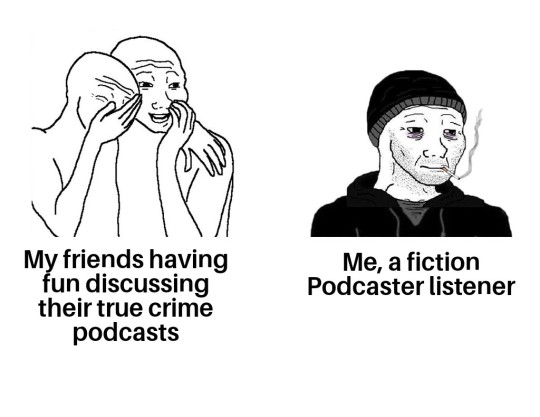
kudos to everyone in my life just letting me talk at them when I need to
#fiction podcasts#audiodrama#the penumbra podcast#erraticuspod#woe.begone#barjory buffet#the amelia project
817 notes
·
View notes
Note
If you don't mind my sharing my own, probably less spicy POC rep in audio drama take: the AD community's tendency toward celebration of "representation" within the medium as if this rep applies to anything substancially besides queer characters is exausting. Sure, queer rep is important but so often reading "there's rep for everything!" and the cast is like, 95% white? Or, bafflingly, people claiming diversity for something that is entirely fanon? Mmh.
Hi anon!
My take is just about as spicy, honestly.
There's a tendency to value "racially ambiguous" characters played entirely by White actors over actual BIPOC characters
(usually with BIPOC actors, though I'm not as strict about this since I don't mind White actors playing BIPOC characters so long as BIPOC voice actors can play White characters and no BIPOC actors lose voice acting opportunities. And as long as more attention is given to BIPOC creators than we're getting currently).
It sometimes feels as though BIPOC (Black, Indigenous, People Of Colour) characters and creators are overlooked in favour of characters who are ostensibly White but drawn by fandom as BIPOC.
I've seen a lot of support in the community from fellow audio drama people; I've felt uplifted by my fellow creators who are White, and I always appreciate and value that. And obviously some shows are just well made and part of their success is based on other factors.
But as someone who's also aware of audio drama fandom, it's easy to see how much favour is given to White Characters drawn as BIPOC in comparison to characters who are BIPOC in text, and I'm not sure why.
That's my spicy opinion. I follow a few BIPOC creators but I can only name two that have an amount of success comparable to White audio drama creators (Gabriel Urbina of W359 fame and Octavia Bray of Atypical Artists), but my knowledge is limited.
And that's not even getting into female led audio drama, but I do love the success of creators such as Lauren Shippen in the space.
I'm not here to yuck anyone's yum or blame anyone for this phenomenon, but I do think it's worth thinking about. Why I see 50 brown Jonny Simses for every canonically brown Samama Khalid. Maybe it's all a coincidence based on other factors. Maybe White characters invite more imagination in their depiction or something.
I don't mind BIPOC depictions of ostensibly White or "racially ambiguous" characters, but I'm not a big fan of if they outnumber depictions of canon BIPOC characters. I just think the latter deserve more love.
I'm no expert. Also I'm mostly in the horror space, apart from my love of Life With Leoh (a sci fi romcom). My knowledge is very limited so if anyone would like to contradict me, I welcome it (especially if it means discovering more BIPOC led shows).
I don't want this to just be about complaining, so please feel free to shout out some fantastic BIPOC led audio drama (either created by or with a majority BIPOC cast) or even share some art you've done of characters from them and I'll happily share them.
My favorites are Wolf 359 (by Gabriel Urbina) and Life with Leoh (by Octavia Bray)!
274 notes
·
View notes
Text
Blessed are the listeners who savor one episode at a time, for theirs are the little details and thematic contemplations.
Blessed are the listeners who binge a hundred episodes in two weeks, for theirs are the emotional rollercoaster and the being caught up.
Blessed are the listeners who haven't started this show but it's been on their list for a while and maybe someday they'll start it. They know they should. They will. Just as soon as they're done with the third relisten of their favorite show. And they catch up on that other thing. Promise
948 notes
·
View notes
Text
Personally I use Antenna Pod, and Player FM.
310 notes
·
View notes
Text
My favourite way of choosing podcast to listen to is seeing people being batshit crazy, extremely enthusiastic, writing serious interpretations and silly posts about it, posting fanart, etc.
So, audio drama folks, please reblog this and write me some amazing stuff about your favourite podcasts. It can be honest recommendation! Maybe some blorbo thoughts about your fav character! Or deep reflection about themes and motifs! Whatever you would like to share with someone but didn’t have a chance to. Don’t worry about me knowing what you talking about, just pure your little podcast heart for me, pretty please. (And of course as always official podcast accounts are welcome to join!)
#come on show me you podcasts thoughts!!!#I love seeing people being enthusiastic about things#i figured out a way to get my favourite podcast rec straight to my notifications#I am very proud of myself#fiction podcasts#audio drama#podcast recommendations
527 notes
·
View notes
Text

I made this for Malevolent but it applies to many others. Feel free to use.
#malevolent podcast#Malevolent meme#Tma#Ghost wax#Hfth#Red valley#Shadows at the door#old gods of appalachia#Fiction podcasts#Horror podcasts
271 notes
·
View notes
Text
can we talk about the teamwork podcasters have built??? collaboration is genuinely everywhere in this space—once you've listened to three or four podcasts, you've probably heard the creators of at least four more podcasts, and then in turn will discover other shows from those podcasts, with new voices (alongside creators you're already familiar with!) sure, it's by design, & small shows need to support one another to survive, but idk, i just have such an appreciation for the podcasting community :,)
#podcasters and creatives i have so much respect for you#please keep encouraging and supporting each other#it's evident that you all genuinely care about the stories other people are telling#we love to see it#!#podcasts#fiction podcasts#horror podcasts#audio drama
972 notes
·
View notes
Text
hello err fans of podcasts :3 im doing a project for school on fiction podcasts so..
if you could reblog this with all the podcasts you listened to in order (if you want to provide commentary as to why you went from one podcast to another (for example, the magnus archives to malevolent as a popular example->the eldritch horror) that'd be really useful! thanks :)
edit: i finished the assignment and got the grade back, it was really great! thank you for all your help!
#fiction podcasts#the magnus archives#malevolent#welcome to night vale#woe.begone#the penumbra podcast#red valley#god uhh what other podcasts are there!#trice forgotten#hello from the hallowoods#wolf 359#archive 81#camp here and there#death by dying#wooden overcoats#i dont know what else to put ehnjbgdhnhh
980 notes
·
View notes
Text
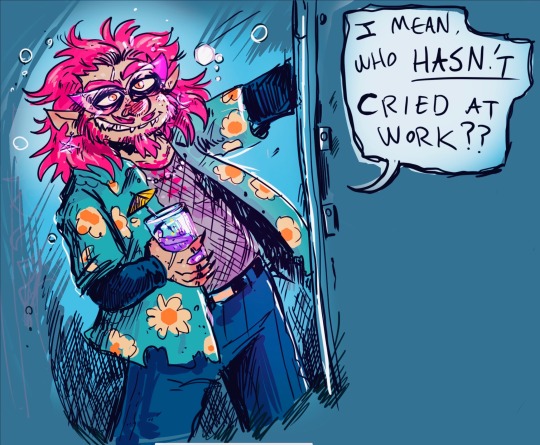
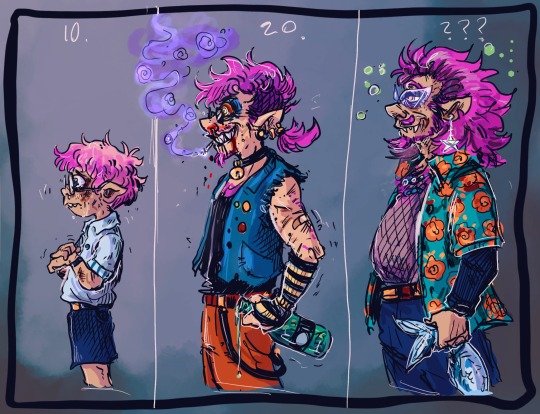
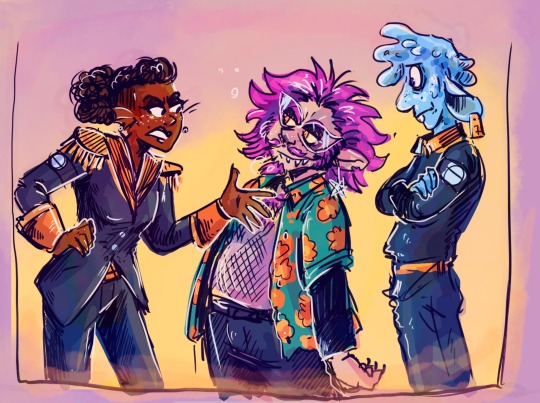
Oh hey! I hadn’t posted these Stellar Firma sketches here!
(I wanna be known as the person who won’t let go of this podcast.)
I needed to draw my comfort characters a bit last Christmas.
It’s always helpful to draw Trexel when I feel anxious, cause he’s a mess but really owns it!
And SO CAN YOU!😎🤡😎🤡😎🤡
#stellar firma#stellar firma fanart#grey art#fan art#trexel geistman#hartro piltz#David 7#fiction podcasts#comfort character#my blorbos
556 notes
·
View notes
Text
Where are all the Audio Fiction Fandoms?
To be clear, this isn't me complaining, and I know, there are plenty of fandoms for audio fiction podcasts and the like.
But I have always found it weird how few shows get the big, self-sustaining kinds of fandoms, the ones where there's always at least a little trickle of fanfic and fanart. So weird, in fact, that I've been thinking about it on and off for the last 5-6 years, and I have a few theories I'd like to share with y'all as to why, and to see if I can't get some feedback from the audio fiction fans on Tumblr.
Theory 1: Audience Size
The first theory is mostly about demographics - fundamentally, a fandom has to be large enough to sustain itself, and only a certain number of audience members are going to become the kind of fans who make fan works, so ultimately, an audio fiction show needs to get popular enough before fan works start appearing.
There's plenty of support for this theory, of course - Welcome to Night Vale, Wolf 359, The Adventure Zone and The Magnus Archives are titans in the fiction podcast space, and indeed they have big fandoms. But, with that said, there's plenty of other podcasts that are just as big that don't have fandoms, so this can't explain it all.
Theory 2: Audience Distance
This one is similar to the first, but subtly different. A few creators in the space I've talked to have noted that they'd never make fan works of their friend's shows - that feels weird, like deliberately treading on their friend's work. They don't have this feeling when playing in big fandoms, or fandoms where they don't know the creator. This implies to me that fans need a certain level of distance from creators in order to feel comfortable playing with that fictional space. While this is less the case now with the fall of Twitter, a lot of shows, for better or worse, used social media as the primary pillar of their marketing, as well as using Patreons with special access as part of their monetization strategies.
In short, it's never been easier to get close to the creators of your favourite shows, and for smaller shows, the most exuberant fans - the kinds who might make fan works - are also the kinds of fans who will take those opportunities to get closer to the creators. In short, there just might not enough social distance for fans to be comfortable creating works, not at least until the audience grows sufficiently that a creator simply cannot be that close with their entire audience.
This theory I'm not so sure about these days - this one is probably a lot more dependent on the generation of fandom you belong to. Older generations of fandom are more likely to have this queasiness around creator closeness, because they were creating in a time where fandom was a shadow realm, desperately hidden from The Powers That Be, and "No Copyright Infringement Intended" was carved into fan works as an eldritch attempt at legal protection.
Theory 3: Audience Age
To be clear - there are fans of all ages out there. But it is clear to me that fandom trends young, and part of that is just the time needed to participate in fan culture - creating and consuming takes a lot of time, time that tends gets scarcer and scarcer as you get older (there are obvious exceptions of course - stay-at-home mothers have consistently been a major force in fandoms!). It's possible that audio fiction fans just tend to trend older, and thus don't have the time available to create and consume fan works.
Honestly, I'm not sure how relevant this one is - Audio fiction is becoming more popular with younger audiences and slowly shedding the "old fuddy-duddyness" that surrounded it when I was first getting into the space. And, ya know, there are audio fiction fandoms out there, so obviously either the youth aspect of fandom isn't a thing, or it is, but audio fiction audiences are still trending young anyway.
Theory 4: We're getting what we need!
A lot of academic discourse often focuses on the idea that fandoms create for a reason - and that reason is often to focus on parts of a fiction that the original text, for whatever reason, doesn't. The most obvious form of this is the many, many, many examples of ships and erotic fanfiction. You, as a fan, watch a show, see something between two characters, and get frustrated that the show isn't giving you more of that, won't make what is clearly obvious to you, explicit. So, you consume and/or create fan works that help relieve that tension instead.
Or, in shows where the focus is primarily on plot advancement or action, you feel a desire to get to know the characters better - you see the stirrings of these characters, you want to know them better, but the show just isn't the type of show to give you that slow, character-heavy scene/episode that you know would give you exactly what you need, so, again, you go consume and/or create fan works to fix that.
It's very possible that a lot of audio fiction is already built to give these sorts of fan audiences what they want. There's already romantic relationships, characters are openly queer, the nature of the audio medium means that character-heavy scenes are something that the medium directs creators towards, so there's already a lot of character engagement. So, for many fandoms, there just isn't much need to create fan works - there's no tension between what the show is and what it could be.
Theory 5: We can make our own at home!
One interesting theory is that one reason that people make fandom is because, fundamentally, the creators understand that they're not going to be making a film, or a TV show, or a book. They have creative urges, and they're not in a situation in life where they're likely to overcome the enormous barriers to entry in mainstream media, so, in combination with the stuff in theory 4, they play in other people's worlds instead. They know that there's already an audience who will consume their work (they're part of that fan community, after all!), so they can get that validation of creation without needing to create their own TV show or film or book, etc.
Podcasts, however, are different. Now, it's not true to say that podcasts have low barriers to entry - to create a podcast, there's a lot of skills you either need to learn yourself, or find collaborators with those skills. But, those barriers to entry are much lower than visual media. At the very least, audio production is significantly cheaper and less complicated for an equivalent runtime.
Better, podcasts have absurdly low barriers to publication - There are no gatekeepers to satisfy, no distributors you have to convince. Once your thing is made, pretty much no one can stop you from distributing that work. You don't even really need to pay for a podcast host - there's a few free podcast hosts now. So, once you've done the work, pretty much nothing stops you from publishing said work.
So... If you're a creative fan, who loved a show but thinks you can do better? Well, you can! You don't need to play in other people's spaces, you can be inspired by the podcasts you listen to to create your own original work, in the same medium and genre.
What do y'all think? Which of these feel right, which of these feel obviously wrong? Are you part of a audio fiction fandom? What does your fandom feel like to you on the inside? As a audio fiction creator, it's kinda hard for me to get into the inside of fandom culture, so insider perspectives would be super neat for me, so please reblog this to anyone you feel might have an interesting perspective on the whole thing!
#audio fiction#audio drama#podcasts#fiction podcasts#welcome to night vale#the magnus archives#tma#wtnv#podcast theory#fandom#audience feedback requested!#taz#the adventure zone#wolf 359#fandom meta#fandom culture
326 notes
·
View notes
Text
Coming 2024 - New Fiction Podcast!
Oh hiiiii tumblr. We're fashionably late to the party in our announcement here - but hi!
Camlann is a new post-apocalyptic, urban fantasy scripted fiction podcast inspired by British folklore and Arthuriana. Alternatively, it's about three idiots and their dog, surviving the apocalypse in a small cottage in Wales. It's full of queer, trans characters and made by a queer, trans, disabled production team. We're really excited about it!
The show is written by Ella Watts (hi!) and produced by @tincanaudio
We'll be sharing more soon as we get closer to release, but in the mean time, our ask box is open. It's nice to meet you all!

[Image ID: A hazy golden mist over brown, sparsely tree-covered mountains. Block white capitals read the title, 'Camlann', with smaller text reading: 'Coming 2024' and 'A scripted fiction podcast by Ella Watts, from Tin Can Audio'. In the bottom right is the Tin Can Audio logo, which looks like a simplified mixer.]
262 notes
·
View notes
Text

Happy spooky season! Have some Wandering Night Gaunt concept art from before making the podcast!
483 notes
·
View notes
Text
What do Fiction Podcasts have to say about the future?
Whenever you write a story set years from now, how you construct the world around it creates a new way to see the future, a fictional image to a reality we could be headed towards.
Fiction podcasts love to play within the sci-fi genre, and the thousands of audio dramas they have given us new pictures of what our world could look like in the next century (or a few years closer).
In this article I want to analyze the settings in the following shows: Hello from the Hallowoods, Desperado and The Strange Case of Starship Iris.
Hello From the Hallowoods
Hello From the Hallowoods welcomes us to a world ravaged by black rains and capitalism’s greed. After a natural (but man-made) disaster involving acid rain and flooding the world’s successions gave birth to two different types of beings: those who prefer to dream in a company’s “Prime Dream” and those who stay awake to continue living.
Even though the world is post-apocalyptic on paper, it never feels like it. Rather it is enchanted, there are woods where gods, revenants, devils, giants and zombies fall in love with themselves and with each other, places where community is found.
This, I attribute this to the fact that most characters don’t lament a nebulous “end of the world”, since this is the world they have always been living in and they are going to make the best of it: find family, friends, lovers, build homes and destroy bigots.
You leave the world of Hello From the Hallowoods knowing that even a doomed world is worthy of being awake for.
Desperado Podcast
Desperado Podcast also takes us to a world that was looted, but this time mainly by religious colonialism.
Neo-colionalism has made itself tangible through genocides and direct targeting to believers that worship other than the “Old man in the Sky”. In its first episode a community in México which revere La Catrina (a goddess in the show inspired by a popular figure in mexican art) is wiped out by the crusaders.
From there our protagonist Elio is the sole survivor of his people, however all is not lost as he teams up with Talia (the chosen of Baron Samedi) and Shinji (whom I believe is a death kami?).
Elio now literally carries the memories of his community as the vessel for her goddess. Likewise in Desperado, the magic of the characters is the legacy their ancestors gave them, and it is what keeps them alive in the violent world.
Though if we are ever to worry that our protagonist could fall into its clutches, the structure of the world soothes our preoccupations. You see, it is the characters within the story that are narrating their own experiences to the audience so we know that after all the pain, they ended up safe.
What Desperado tells us about the future is that, even with the ongoing genocides, white-washing of our culture, and neo-colonialism in general we will end up victorious in the end, and that our history will be forever within our memory.
The Strange Case of Starship Iris
The Strange Case of Starship Iris, is the most sci-fi audio drama out of the bunch. It follows the crew of the Rumour, a smuggler's ship, as they try to uncover the dark secrets of the Federation and evade persecution.
As with the other two properties, the future is not an easy world, but our characters are making the most of it.
In a post-war galaxy, the crew of the Rumour is smuggling space-ship parts, medicine, and erotic magazines until they find a help alarm coming from the Starship Iris and rescue biologist Violet Liu. From there they are involved in a mystery which, if the truth comes to life, they could be charged with treason against the Intergalactic Republic.
Throughout the two seasons of the podcast, Violet Liu and company heal together the scars that the war and its result: the Intergalactic Republic left them. They fight against the government not only through robberies, infiltration, and coordinated efforts with rebel groups but also by eating latkes, drinking, singing shanties, and getting gay jewish married.
To conclude
if queer podcasts are telling us something about the future, it is that it may be equally messed up as the present but that queer, disabled people of color will exist beyond the end of the world and that even in the bleakest of futures we will continue to love and thrive.
#hello from the hallowoods#desperado podcast#strange case of starship iris#hfth#tscosi#article#audio drama#audio fiction#fiction podcasts#also#is so funny how only one out of the three shows is like “true” sci-fi but hey the three are set in the future (or an alternate reality in d#desperados case#but whatever)
211 notes
·
View notes
Text
I need some cozy, feel-good audio dramas. No big stakes, heartbreaks or existential crisis. Just nice calm warming vibes, please (Fantasy, sci-fi and comedy very much welcome)
#don’t even try recommending horror#having anxious time right now and need something very not anxious#audio drama#podcast recommendations#fiction podcasts
231 notes
·
View notes